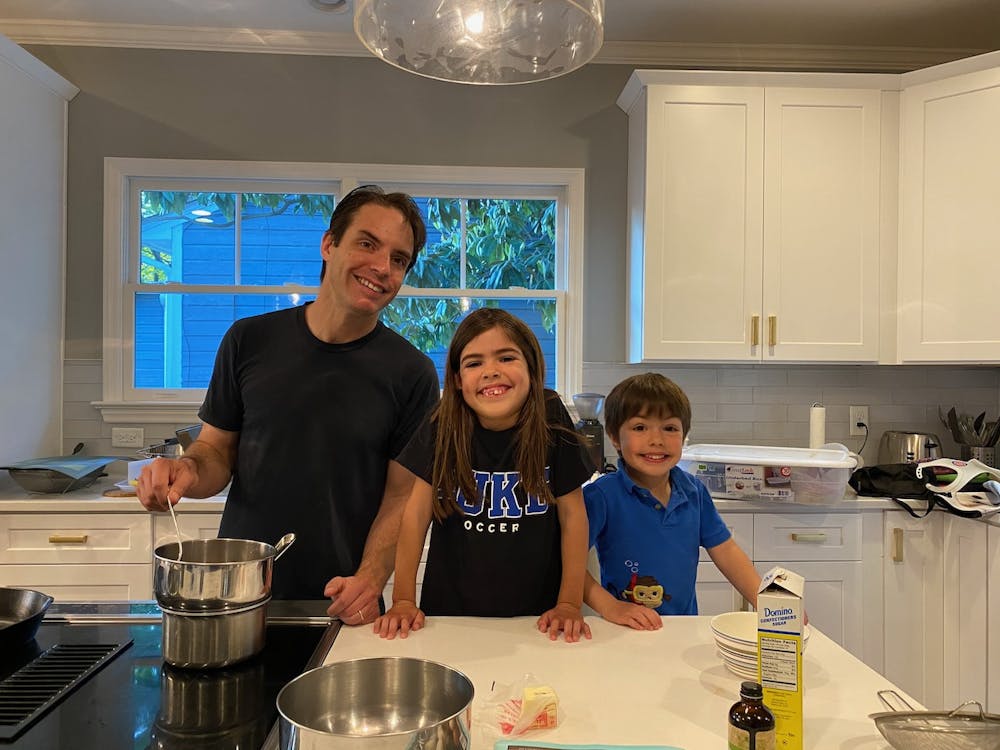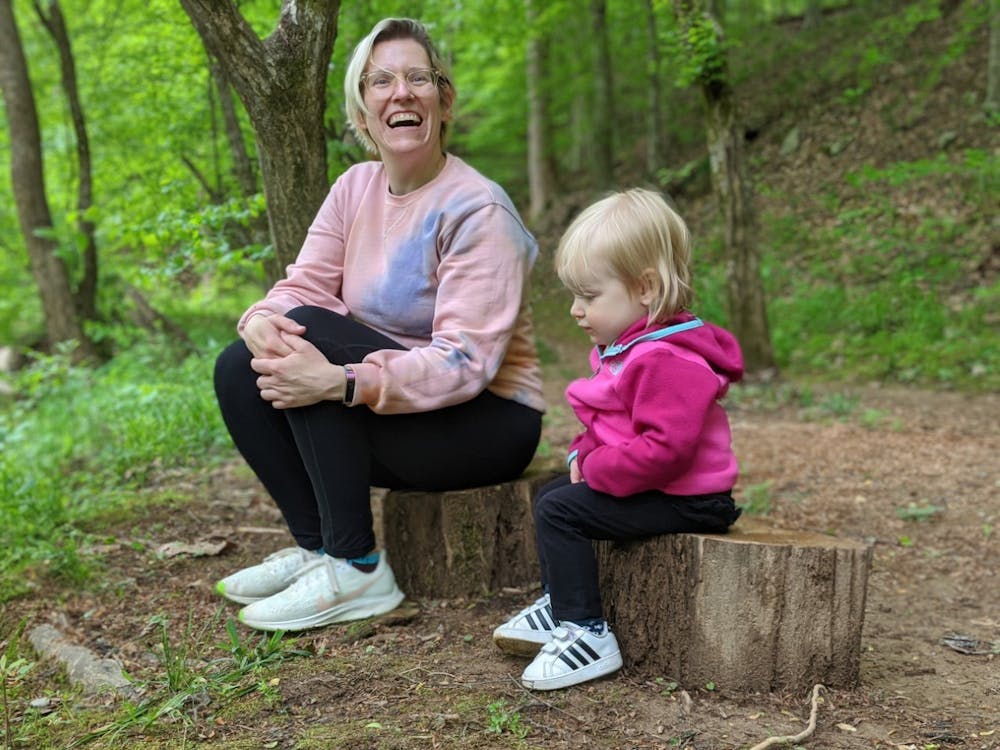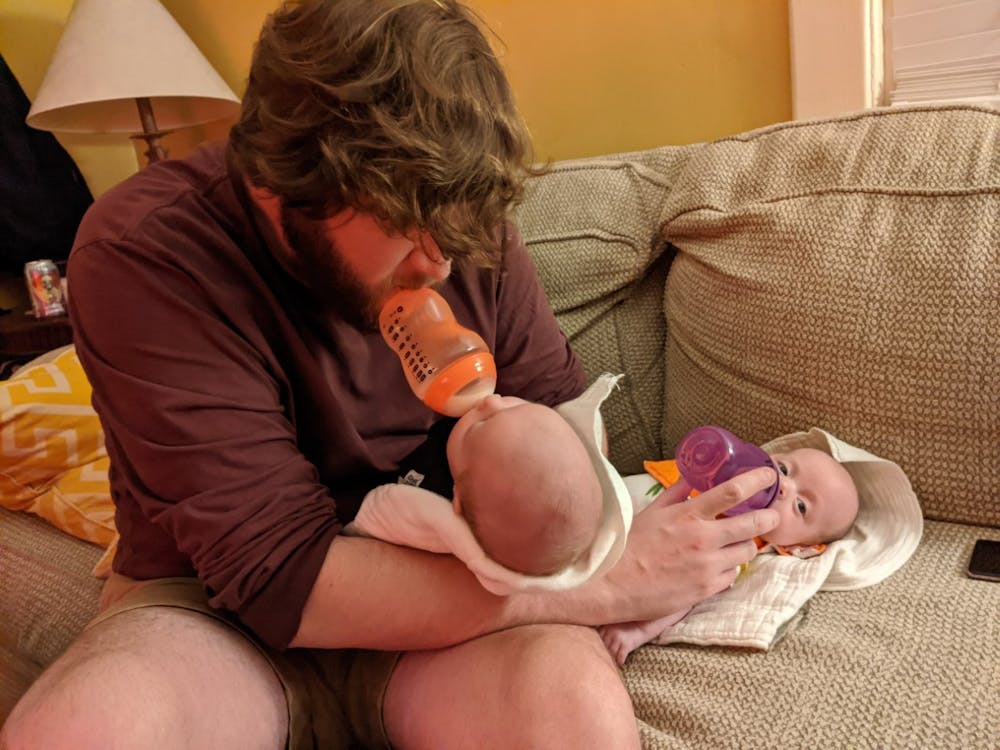Meet with students and console crying babies. Lecture and put a movie on for the kids. Research and homeschool. For Duke faculty with young children, this is the daily reality.
Ever since the transition to distance learning, faculty have been working from home, balancing their personal and professional responsibilities. For those with young children, this has meant simultaneously taking on the roles of an online educator to their students and a caretaker for their children.
Alexander Kirshner, associate professor of political science, has a three-year-old and a six-year-old at home. Though they are both engaged in online learning, the siblings are too young to focus on Zoom independently and require either Kirshner or his wife to supervise them, he said.
“The situation that parents of younger children are in in general at the moment is that their work effectively doubled. What a school system is is both a system to educate children and a mechanism for allowing parents to go to work,” Kirshner said.

His class, Introduction to Political Philosophy, continued to meet synchronously, though he described this arrangement as, at times, difficult.
“When you teach you are responsible for showing up at class at a particular time and engaging with the students, and when you’re a parent you have to be with your kids. So, it’s easy to imagine these things coming into conflict,” he said.
Other professors opted for an asynchronous model to help accommodate their schedules.
Leslie Maxwell, instructor of Thompson Writing Program and mother to a toddler, taught three 12-student sections of Nature Writing, a Writing 101 course, in Spring 2020. Though her class still met synchronously once a week, the rest of the work was online.
“I felt like I didn’t want to just lose the community that we’ve built over the last two and a half months, but I also knew that my time had just gotten a lot more constrained in certain ways,” she said.
Maxwell said that she and her husband had to effectively plan their days around childcare, discussing each night who would take care of their daughter throughout the day.
“If there were times that he needed to be in a meeting or do something for his work, I would be taking care of our daughter, and then if I was teaching or needed to grade, he would take care of her,” she said.

Laurie Mauger, lecturer in the department of biology, shared similar sentiments. Her kids, who are five and three, constantly demanded her attention while she was working.
“I couldn’t get anything done during the day because if they were awake, they just wanted to be with me. Every now and then I could throw a movie on and get some work done with them sitting next to me, but for the most part I was working late at night. And I’m not a night person so that was an adjustment,” she said.
For Brian Fitzpatrick, new parent and lecturer in the department of mathematics, balancing childcare and continuing to teach was particularly challenging.
In February, two weeks before Duke transitioned to remote learning, he and his wife, Sarah Schott, associate professor of the practice of mathematics, welcomed twins into their family. Born prematurely, the babies spent seven weeks in the neonatal intensive care unit. Though Schott took the rest of the semester off, Fitzpatrick continued to teach, adapting his course into an online format.
“For me, there was a certain amount of guilt. Once I started having to [transition to distant teaching], I more or less stopped visiting the twins at the NICU because I was just working all the time. My wife was doing the visits while I was doing work, basically. So that was tough,” Fitzpatrick said.
Fitzpatrick and Schott originally planned for Schott’s family to help take care of the newborns, but the COVID-19 pandemic rendered that plan unsafe. This was the first time his home life responsibilities blended with his professional responsibilities in a way that he couldn’t untangle, he said.
Yet, overall, faculty with young children were appreciative of the opportunity to spend more time with their kids.
“Being able to see her all day, every day and see how her mind is changing and growing and how she’s developing is pretty amazing,” Maxwell said.
Mauger agreed, stating that the “imaginative games and fun and play” of her kids are both rewarding and exhausting.
“I would kill for some alone time right now. So I think being able to get away to the office would give some of that alone time that I need. But I would miss being with them all the time,” Mauger said. “I don’t think I’ve [been] on a Zoom meeting yet that my kids haven’t interrupted.”

Editor's note: This article has been updated to reflect that Maxwell taught three 12-person sections of her Writing 101 course.
Get The Chronicle straight to your inbox
Signup for our weekly newsletter. Cancel at any time.

Preetha Ramachandran is a Trinity senior and diversity, equity and inclusion coordinator for The Chronicle's 118th volume. She was previously senior editor for Volume 117.

